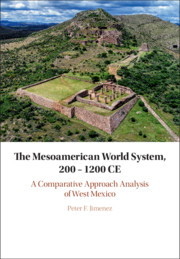Refine search
Actions for selected content:
3 results
Chapter 13 - World-Systems, Literature and Geoculture
- from Part II - Development
-
-
- Book:
- Globalization and Literary Studies
- Published online:
- 01 April 2022
- Print publication:
- 21 April 2022, pp 210-225
-
- Chapter
- Export citation
Chapter 6 - Shadows of Haiti
-
-
- Book:
- A History of the Literature of the U.S. South
- Published online:
- 29 April 2021
- Print publication:
- 20 May 2021, pp 112-125
-
- Chapter
- Export citation

The Mesoamerican World System, 200–1200 CE
- A Comparative Approach Analysis of West Mexico
-
- Published online:
- 10 August 2020
- Print publication:
- 27 August 2020
